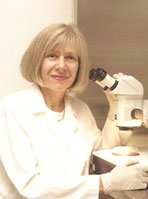Stem cell clinical trial at University of Michigan finds treatment helps ALS patients
A closely-watched clinical trial at the University of Michigan has produced positive results for ALS patients treated with stem cells, according to media reports.
The trial is the first of its kind to use stem cells for amyotrophic lateral sclerosis (ALS), also known as Lou Gehrig's disease. It's a progressive neurodegenerative disease that affects the nerve cells in the brain and spinal cord.

Dr. Eva Feldman
Courtesy of U-M
At the time of the clinical trial, the patients that saw positive effects were in the early stages of the disease and did not have ALS symptoms of trouble speaking or swallowing, according to the Detroit News.
According to the ALS Association, the disease affects as many as 30,000 people in the U.S. each day.
Amy Biolchini covers Washtenaw County, health and environmental issues for AnnArbor.com. Reach her at (734) 623-2552, amybiolchini@annarbor.com or on Twitter.


Comments
Technojunkie
Tue, Jul 9, 2013 : 2:01 p.m.
I bet no one bothered to do a hair test for mercury toxicity on any of the ALS patients.
ChelseaBob
Tue, Jul 9, 2013 : 11:10 a.m.
This is the first trial I've seen where they used fetal stem cells. Usually they use adult stem cells cultured from your own bone marrow, as these are much safer. Anyone know the rationale for using fetal here?
Ricardo Queso
Tue, Jul 9, 2013 : 12:42 p.m.
"Safer" when you have a diagnosis of ALS?
UloveM
Tue, Jul 9, 2013 : 1:21 a.m.
Though preliminary, the results offer hope, said Dr. Eva Feldman.
Silly Sally
Mon, Jul 8, 2013 : 9:56 p.m.
Four patients out of how many? Four out of four, four out of eight, four out of eighty?
1bit
Mon, Jul 8, 2013 : 10:35 p.m.
@Susan: beat me to it by a minute!
1bit
Mon, Jul 8, 2013 : 10:34 p.m.
15. It's in the original Detroit News article. That article also describes what has happened to the other 11. The etiquette of internet journalism is to not completely copy the original article but briefly summarize and link to it.
Susan Montgomery
Mon, Jul 8, 2013 : 10:33 p.m.
I was wondering the same thing, Silly Sally. From the Detroit News Article it appears there were a total of 15 patients. To quote: " Although a small group of patients improved or stabilized during Phase I of the trial, five of them have since died from the disease. A sixth patient died of a congenital heart defect unrelated to ALS. The other five patients in Phase I are still alive but had a long disease course before entering the trial, and do not represent typical ALS."
harpua
Mon, Jul 8, 2013 : 9 p.m.
good news, keep up the great work Dr. Feldman.
Dog Guy
Mon, Jul 8, 2013 : 8:18 p.m.
Having put its reputation on the line, The University of Michigan is under pressure to produce stem cell results or even hypothetical possible contingent hints of a suggestion of potential promising future results.
sh1
Mon, Jul 8, 2013 : 6:35 p.m.
Yay, science!
Ricardo Queso
Mon, Jul 8, 2013 : 5:58 p.m.
Congratulations Dr. Feldman!
BhavanaJagat
Mon, Jul 8, 2013 : 4:53 p.m.
WholeDude - Whole Doubt: The scientific method is based upon the principle of validation. Skepticism is the guiding philosophy of scientific inquiry. If a thing is said to be true, science demands to know as to why it is true. When we use pharmaceutical agents in therapy, the chemical formula of the drug is known and is clearly understood. In therapy that involves the use of Stem Cells, the identity of the therapeutic agent is not clear. At a minimum, we have to describe the source of these Stem Cells. I have to know if all the patients involved in the study had received the Stem Cells from the same source. Secondly, these patients involved in the study may have a similar problem and it will not mean that all of them would respond to Stem Cells in a given expected manner. The results of treatment would not be consistent, and predictable if the same treatment is tried on a larger scale. The story does not reveal if immunosuppressive drugs have been used as an adjunct to the Stem Cell therapy and if any success could be attributed to their use.
1bit
Mon, Jul 8, 2013 : 5:17 p.m.
This is a Phase 1 study to determine safety. The Phase 2 study will determine dosage. Phase 3 is efficacy. Phase 4 is aftermarket surveillance (if it gets that far). The Detroit News article is more careful in avoiding "hyping" this treatment as it is still too early in the process.
Max Peters
Mon, Jul 8, 2013 : 4:47 p.m.
Embryotic or Adult stem cells?
1bit
Mon, Jul 8, 2013 : 5:14 p.m.
"The doctors are injecting fetal stem cells provided by Neuralstem Inc., a Maryland company." From The Detroit News: http://www.detroitnews.com/article/20130708/LIFESTYLE03/307080030#ixzz2YTWD5B4D